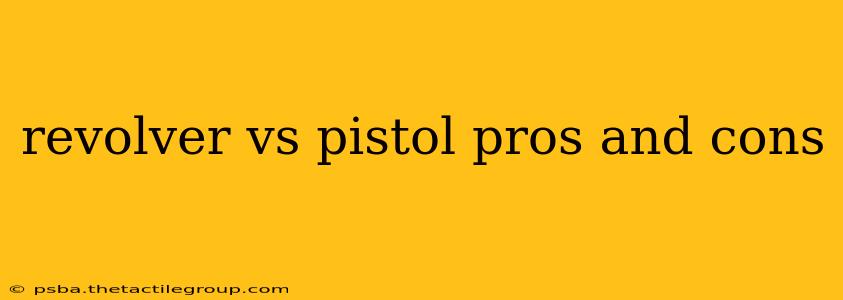Choosing between a revolver and a pistol is a crucial decision for any firearm owner, whether for self-defense, sport shooting, or collecting. Both offer distinct advantages and disadvantages, and the "best" choice depends heavily on individual needs and preferences. This in-depth comparison will explore the key differences to help you make an informed decision.
Revolvers: The Classics
Revolvers, with their iconic cylindrical cylinder holding cartridges, have a rich history and enduring appeal. They're often favored for their perceived simplicity and reliability.
Pros of Revolvers:
- Simplicity and Reliability: Revolvers are mechanically simpler than semi-automatic pistols, generally resulting in fewer potential points of failure. This makes them highly reliable, even under adverse conditions.
- Intuitive Operation: Their straightforward action—load, aim, fire—makes them relatively easy to learn and use, particularly for beginners.
- Double-Action Capability: Many revolvers offer double-action (DA) functionality, allowing you to fire the weapon without manually cocking the hammer. This can be advantageous in self-defense situations where speed is crucial.
- Visual Confirmation of Rounds: The visible cylinder allows for immediate confirmation of how many rounds remain. This is a significant advantage in high-stress situations.
- Ruggedness: Revolvers are often built to withstand more abuse than semi-automatic pistols, making them suitable for harsh environments.
Cons of Revolvers:
- Lower Capacity: Revolvers typically hold fewer rounds than semi-automatic pistols, limiting their firepower. Reloading can also be slower.
- Slower Reloading: Reloading a revolver generally takes longer than reloading a semi-automatic pistol, especially under pressure.
- Higher Recoil: Some revolvers, particularly those in larger calibers, can have significant recoil, impacting accuracy and comfort, especially for smaller shooters.
- Cylinder Swing-Out Mechanism: While convenient, the cylinder swing-out mechanism on some revolvers can be a point of potential failure or malfunction, especially if not properly maintained.
- Limited Availability of Certain Calibers: Compared to semi-automatic pistols, revolvers offer a more limited selection of calibers.
Pistols: The Modern Choice
Semi-automatic pistols, utilizing a magazine for ammunition, are the dominant firearm type today, boasting a range of features and capabilities.
Pros of Pistols:
- Higher Capacity: Pistols offer significantly higher ammunition capacity compared to revolvers, providing greater firepower in self-defense or competitive shooting scenarios.
- Faster Reloading: Reloading a pistol is generally faster and easier than reloading a revolver.
- Lower Recoil (Generally): For similar calibers, pistols often exhibit less recoil than revolvers, making them more comfortable to shoot and potentially improving accuracy.
- Variety of Calibers and Features: Pistols come in a wide range of calibers and features, offering greater customization options.
- Ergonomics: Many pistols are designed with improved ergonomics, providing a more comfortable and secure grip.
Cons of Pistols:
- More Complex Mechanics: Semi-automatic pistols have more complex mechanisms than revolvers, potentially leading to more points of failure if not properly maintained.
- Malfunctions: Malfunctions, such as failure to feed or eject, can occur in semi-automatic pistols. These can be more difficult to remedy in a high-stress situation.
- Requires More Training: Effective use of a semi-automatic pistol generally requires more training and practice than a revolver.
- Potential for Accidental Discharge: With certain safety mechanisms disengaged, there's a heightened potential for accidental discharge, though this is largely dependent on the specific model and user responsibility.
- Less Visual Confirmation of Rounds: Unlike revolvers, the number of rounds remaining isn't visually apparent without checking the magazine.
The Verdict: It Depends
Ultimately, the best choice between a revolver and a pistol depends entirely on your individual needs and priorities. Consider your experience level, intended use (self-defense, sport shooting, etc.), budget, and personal preferences. Thorough research and hands-on experience are highly recommended before making a purchase. Consult with knowledgeable firearm professionals for personalized guidance.

